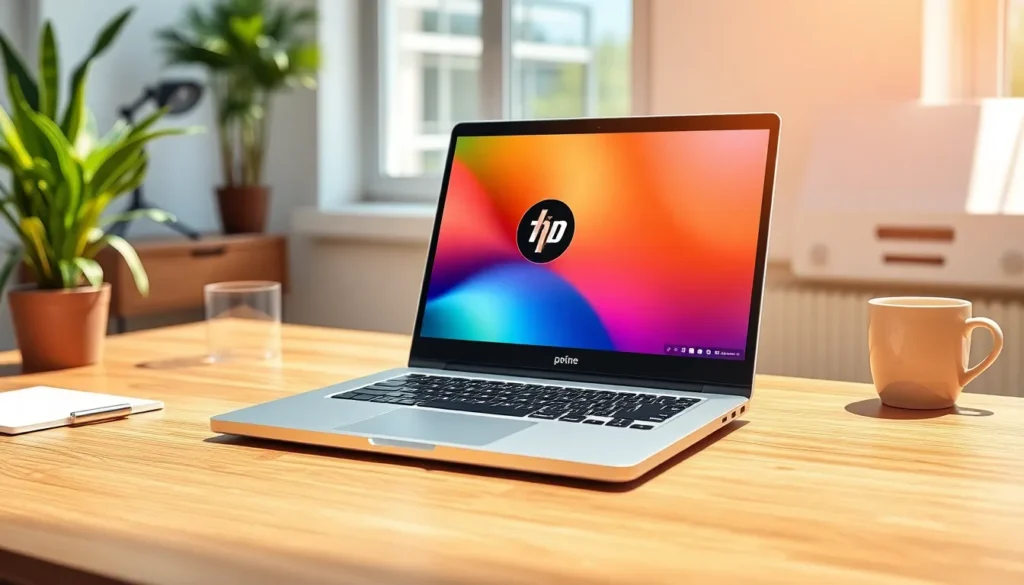Table of Contents
ToggleWhen it comes to HP laptops, the burning question is often: how long can they keep up with the demands of daily life? Picture this: you’re in the middle of an important presentation, and suddenly your laptop decides it’s time for an early retirement. It’s a nightmare scenario that no one wants to face.
Factors Affecting HP Laptop Lifespan
HP laptop lifespan varies based on multiple factors. Understanding these factors aids in maximizing performance and longevity.
Build Quality
Build quality significantly influences durability. HP laptops constructed with premium materials resist wear and tear better. In general, models designed for business use often feature sturdier exteriors. Advanced engineering may also enhance internal components, extending functionality. Investing in higher-grade construction typically results in a longer lifespan.
Usage Patterns
Usage patterns greatly affect overall performance and longevity. Frequent heavy tasks, such as gaming or graphic design, demand more from the hardware. Routine maintenance contributes to longevity as well. Regular software updates and virus scans mitigate potential issues. Lastly, environmental conditions, including heat and humidity, can impact hardware lifespan.
Average Lifespan of HP Laptops

HP laptops typically last between 3 to 5 years, although some models may exceed this range. Various factors influence their longevity, including the model tier, usage habits, and maintenance practices.
Entry-Level Models
Entry-level HP laptops generally feature lower specifications and build quality. Users can expect them to last around 3 years under regular use. Basic tasks like web browsing and document editing may not strain these models. However, heavy multitasking or demanding applications can accelerate wear. Regular updates and proper care can boost their performance, but limitations in hardware may restrict their lifespan.
Mid-Range Models
Mid-range HP laptops often offer better components and construction than entry-level versions. These laptops can last between 4 to 6 years, making them suitable for users with moderate workloads. They handle multitasking more efficiently and provide improved performance for various applications. Owners should still perform regular maintenance, such as cleaning and software updates, to ensure optimal operation throughout their lifespan.
High-End Models
High-end HP laptops provide superior specifications and durability. Users frequently enjoy a lifespan of 5 to 7 years or more from these devices. Advanced hardware supports demanding tasks, including gaming and professional applications, without significant performance dips. Routine maintenance remains essential, as dust accumulation and software issues can still pose risks. Investing in high-end models is ideal for users seeking longevity and performance.
Maintenance Tips for Longevity
Routine maintenance significantly contributes to extending the lifespan of an HP laptop. Implementing essential practices can improve performance and reliability.
Regular Cleaning
Regular cleaning of an HP laptop is crucial for optimal performance. Dust accumulation can obstruct airflow, leading to overheating and potential hardware damage. Users should focus on removing dust from vents and fans, as well as cleaning the keyboard and screen. Use a microfiber cloth for the display and a soft brush for accessing tight spaces. Performing these cleaning tasks every few months helps maintain both aesthetics and functionality.
Software Updates
Keeping software updated ensures the HP laptop runs smoothly and securely. Regular updates enhance system performance and fix vulnerabilities. Users should check for operating system updates and application upgrades frequently. Enabling automatic updates simplifies this process by ensuring that users receive the latest software without needing to remember manual checks. Maintaining updated drivers also improves compatibility with new applications and peripherals.
Signs It’s Time to Replace Your HP Laptop
When an HP laptop shows signs of age, it may signal the need for a replacement. Recognizing these signs can prevent frustration during critical tasks and ensure a smooth computing experience.
Performance Decline
Experiencing frequent slowdowns indicates a decline in performance. Applications may take longer to load, and multitasking could become challenging. Occasional freezes during routine tasks may also signal a need for an upgrade. If the laptop struggles with software updates or compatibility with newer applications, it’s time to evaluate alternatives. Unresponsive features like touchpads or keyboards can further enhance the case for replacement. Users should assess whether these performance issues impact daily productivity.
Physical Damage
Visible wear and tear on an HP laptop can be a clear sign of impending failure. Cracks in the casing or screen not only affect aesthetics but can also lead to functional issues. Loose hinges may cause screen alignment problems, making regular use frustrating. Overheating laptops often indicate underlying hardware problems that compromise long-term reliability. Users should consider the cost of repair versus the benefits of investing in a new device. Persistent battery problems that require frequent charging may also suggest the laptop has reached its limit.
HP laptops offer a range of lifespans depending on their model and usage. With proper care and maintenance, users can extend the life of their devices significantly. Regular cleaning and software updates play a vital role in keeping performance optimal.
Recognizing the signs of decline is crucial for making timely decisions about replacements. By staying informed about the factors that impact longevity, users can ensure their HP laptops continue to meet their needs effectively. Investing in a quality model and maintaining it well can lead to a more reliable computing experience over the years.




